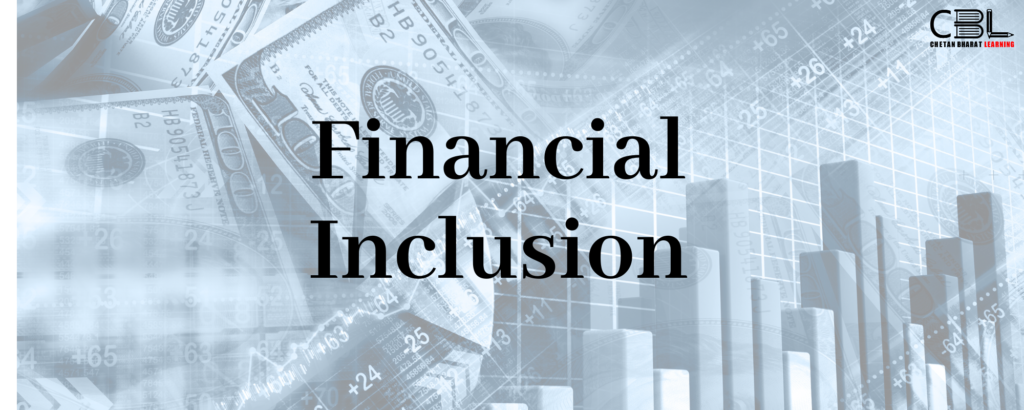Important for
Prelims: Indian Economy
Mains: General Studies Paper III

What is in the News ?
- Financial inclusion has emerged as a critical issue in developing and developed nations, as it enables disadvantaged populations to access financial services and opportunities they would not otherwise have.
- However, despite the progress in expanding financial inclusion, around one-third of adults still lack access to formal financial services, meaning approximately 1.7 billion people worldwide are unbanked, according to the latest Findex Report by the World Bank
What is Financial Inclusion ?
- Financial inclusion means that individuals and businesses have access to useful and affordable financial products and services that meet their needs – transactions, payments, savings, credit, and insurance – delivered in a responsible and sustainable way.
Importance of Financial Inclusion
- Financial inclusion has been identified as an enabler for 7 of the 17 Sustainable Development Goals.
- The G20 committed to advancing financial inclusion worldwide and reaffirmed its commitment to implement the G20 High-Level Principles for Digital Financial Inclusion.
- The World Bank Group considers financial inclusion a key enabler to reduce extreme poverty and boost shared prosperity.
- Financial inclusion has been linked to up to 14% growth in the gross domestic product in developing economies.
India’s G20 Presidency & Financial Inclusion
- The theme of India’s G20 Presidency, “Vasudhaiv Kutumbakam,” underlines the message of equitable growth and a shared future for all.
- The G20 Global Partnership for Financial Inclusion working group met under the grouping’s Global Partnership for Financial Inclusion (GPFI) initiative.
- The G20 Financial Inclusion Action Plan (FIAP)aims to prevent future economic crises by encouraging conditions that promote its objectives of financial inclusion and stability.
- Four major drivers have been highlighted in the new G20 FIAP to lay the groundwork for further progress toward financial inclusion.
- the acceptance of the 2030 Agenda for sustainable development as a worldwide framework for sustainable development
- rapid development and penetration of digital breakthroughs,
- greater emphasis on underprivileged populations,
- mainstreaming financial inclusion.
Challenges to Financial Inclusion
- Lack of access to basic infrastructure
- Low financial literacy
- Limited trust in formal financial institutions
- Insufficient regulatory framework
- High transaction costs
- Lack of diversity in financial services
FINDEX 2021
- It is released by World Bank.
- The Global Findex surveys over 125,000 adults in 123 economies during Covid-19 to better understand how people use formal and informal financial services and digital payment.
FINDEX 2021 : Major Findings
- Account Ownership : The account ownership worldwide increased by 50 % to reach 76 % of the global adult population.
- Access to Formal Banking : Large shares of the global population without formal banking (130 million and 230 million, respectively) lives in India and China because of their size. Women are often excluded from formal banking services because they lack official forms of identification, do not own a mobile phone or other forms of technology and have lower financial capability.
- Unbanking : 24 % of adults are unbanked globally. Lack of money is one of the multiple reasons. Distance is a barrier for 31 % of unbanked adults.
- Digital Payments & COVID-19 : Covid-19 pandemic catalyzed growth in the use of digital payments. In developing countries in 2021, 18 % of adults paid utility bills directly from an account. About one third of these paid bills online for the first time.
- Mobile Money : Mobile money has become enabler of financial inclusion in Sub-Saharan Africa, especially for women.
- Financial Worries : Adults in developing countries are more likely to worry about finances than adults in high-income countries. Concerns around medical expenses are highest in Sub-Saharan Africa and South Asia, where 64 % of adults are very worried and the lowest in East Asia and the Pacific, where 38 % of adults are very worried.
Practice Questions for Prelims
Consider the following statements regarding FINDEX 2021 :
1. It was released by International Monetary Fund.
2. It surveyed 123 economies during COVID-19.
3. As per the report, India and China have a high share of people without formal banking access.
Which of the above statements is/are correct ?
a) 1 and 2 only
b) 2 and 3 only
c) 1 and 3 only
d) 1,2 and 3
Ans. b)




Leave a Reply
You must be logged in to post a comment.